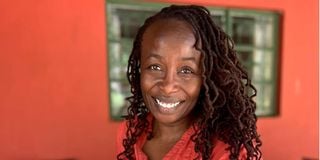Life lessons from the bee lady of Machakos

Sandra Mutisya is a beekeeper and herbalist who hosts beekeeping adventures at Muthoki Country Lodge in Machakos.
What you need to know:
- Sandra Mutisya is a beekeeper and herbalist who hosts beekeeping adventures at Muthoki Country Lodge in Machakos.
- Bees see a wider colour spectrum and can smell and see you. They are even smarter than dogs. I know that mine know me because when I talk to them, I see a reaction.
How did you get into beekeeping?
I began keeping bees when Covid-19 struck and people were being advised to make remedies using honey and lemon to prevent it. Before that, my parents kept hives for 15 years and were what I call telephone beekeepers, meaning they never went to the apiary themselves but instead hired someone to do it.
Initially, I was never interested in any of it. But when I went to the hives for the first time during Covid, I knew it was what I wanted to do. My parents had been harvesting 400 kilograms of honey every three months then giving it all away as gifts. I never knew the value of honey. Today I sell it at between Sh1,500 and Sh3,000 a kilo. We have 100 hives which are 90 per cent occupied. Each has 40,000 to 50,000 bees at any given time. It started as a commercial venture that didn’t need too much oversight.
What motivated you to start hosting beehive tours?
I wanted to educate the local community on beekeeping, especially children, then the parents became interested. I focus more on girls because this is still seen as a men’s activity.
Guests rent our gear or bring their own suits. I get a lot of beekeepers who have hives but have never participated in beekeeping. We start by learning the different types of hives and determining the type of beekeeper they want to be – whether to produce wax or honey, or for pollination. Then we go down to the beehives, open one up and harvest, if it’s the right time. Most people fear bees so going to the apiary shows them that while bees sting, they also react to your energy.
What do you mean when you say ‘bees react to your energy?’
In a beehive, you need to be calm and sensitive. I believe in talking to your bees and if you’re planning to harvest, tell them you’re coming so that they don’t become feral.
This is something I’ve learnt firsthand. You tell them to calm down and they do. Talking to them is like talking to a dog when guests are coming to your home, or to a cow when you're trying to milk it.
Bees see a wider colour spectrum and can smell and see you. They are even smarter than dogs. I know that mine know me because when I talk to them, I see a reaction.
Why don’t you sell in supermarkets?
Each hive can harvest between 10kg and 20kg of honey, which we have branded as Kamuti Honey and only sell in a small batch via social media. I’m not in supermarkets yet because you need to be able to replenish on demand, but bees don't produce on demand. Honey is very dependent on the bees, weather and rainfall. Without rain there will be no flowering plants hence no pollen or nectar. I can't give a supermarket even 10kg of honey because Machakos has been very dry. When you see honey on the shelves consistently, you need to ask yourself where it is coming from, and if it is real.
Do you think traditional beekeeping methods are dying?
Yes, because the generation before us isn't passing on the necessary information and has no one to pass it on to. African stories are oral, but we’re in towns now while our grandparents are upcountry.
How then did you learn to be a herbalist?
It was deliberate. I went looking for that information. We have a tree farm in our 40-acre family property in Machakos. I researched the trees we have and labeled a few. As I did that, I got to know the species and their uses. I looked for people in the community who had indigenous knowledge and combined it with conventional knowledge.
Why do you believe that everyone in Nairobi should have a beehive?
In the city, all these rooftops should have hives because then we can foster bee colonies everywhere.
The more we take over a space, the more we eradicate the natural balance of that place. If you don't have bees, you don't have maize, apples, fruit trees and such because bees, like butterflies and moths, are pollinators.
Most of the time if people see a bee in their homes, they call an exterminator instead of calling a beekeeper to move them, or place them in a garden to pollinate.
Do you know that some farmers growing food literally have to pollinate manually? In Ukambani, none of my neighbours have bees. They say that they will kill their cattle, but I also have sheep and cows here.
There’s no understanding of how to coexist, and everyone who had the knowledge is gone. My neighbours tell me about how their grandparents kept honey, but they don't do it themselves. I hope to encourage more people to take it up.




